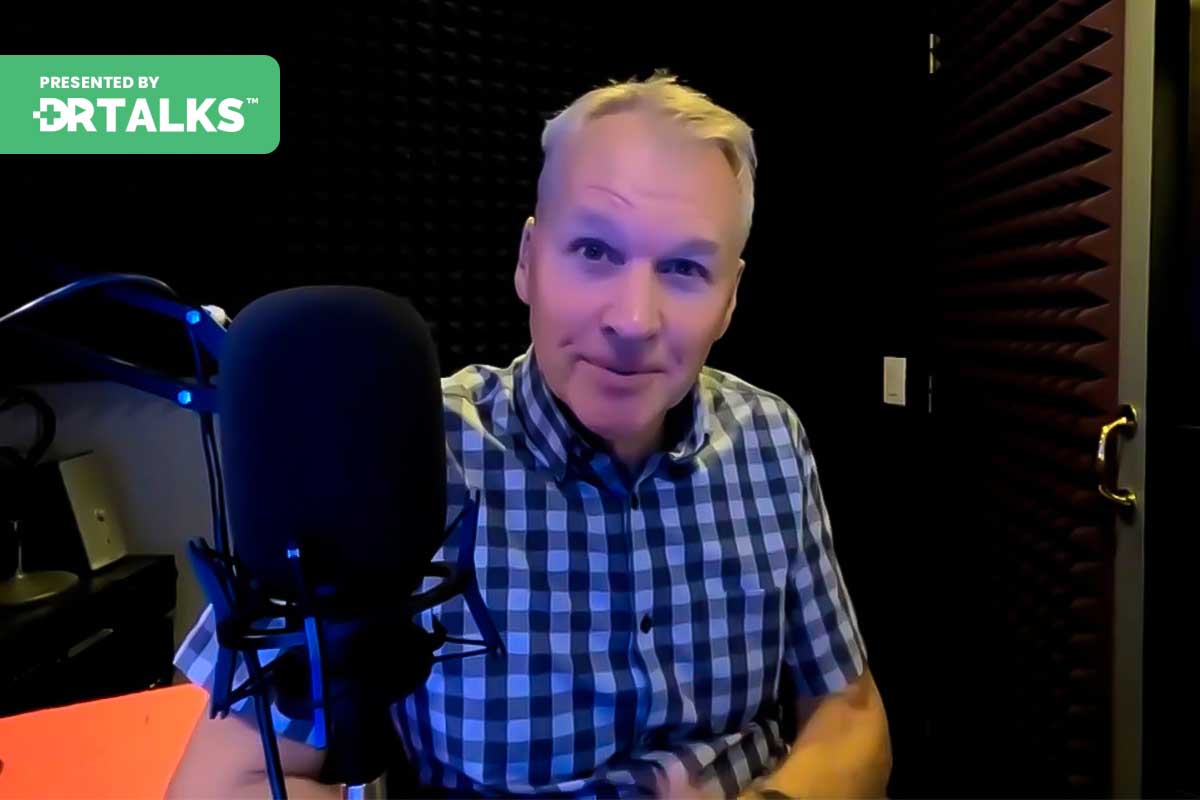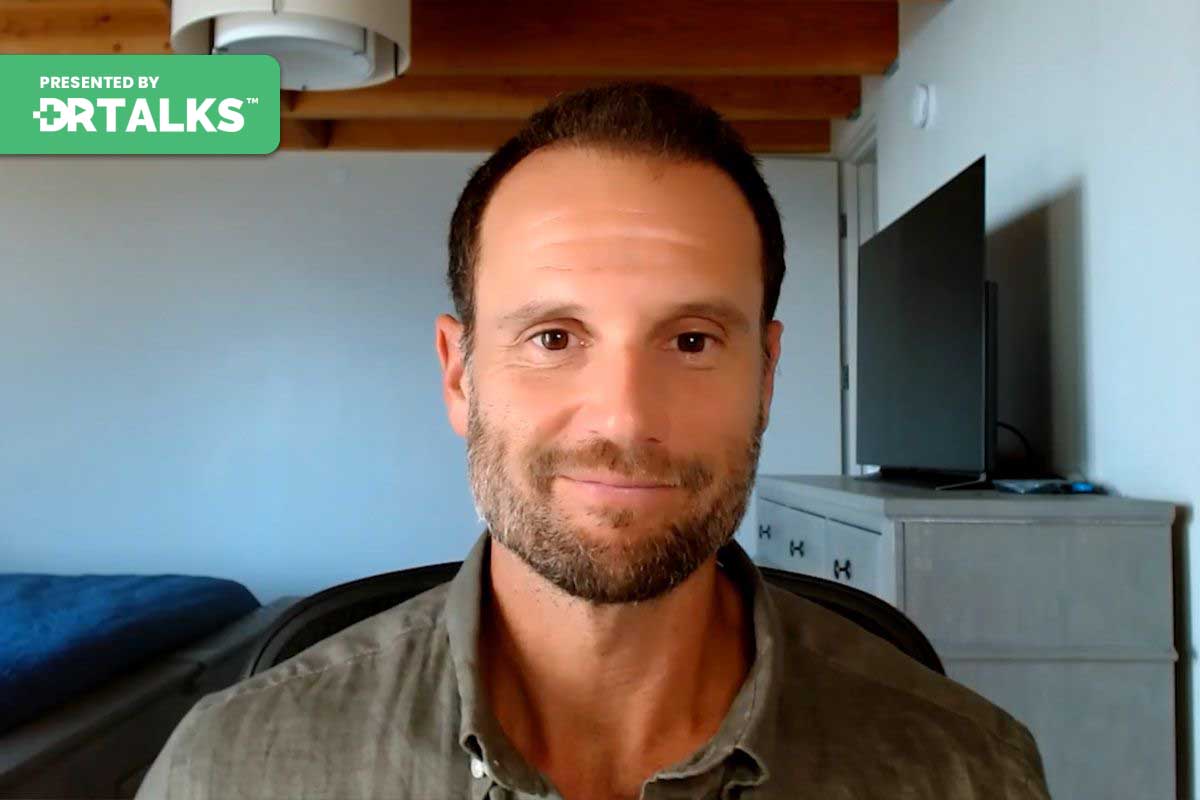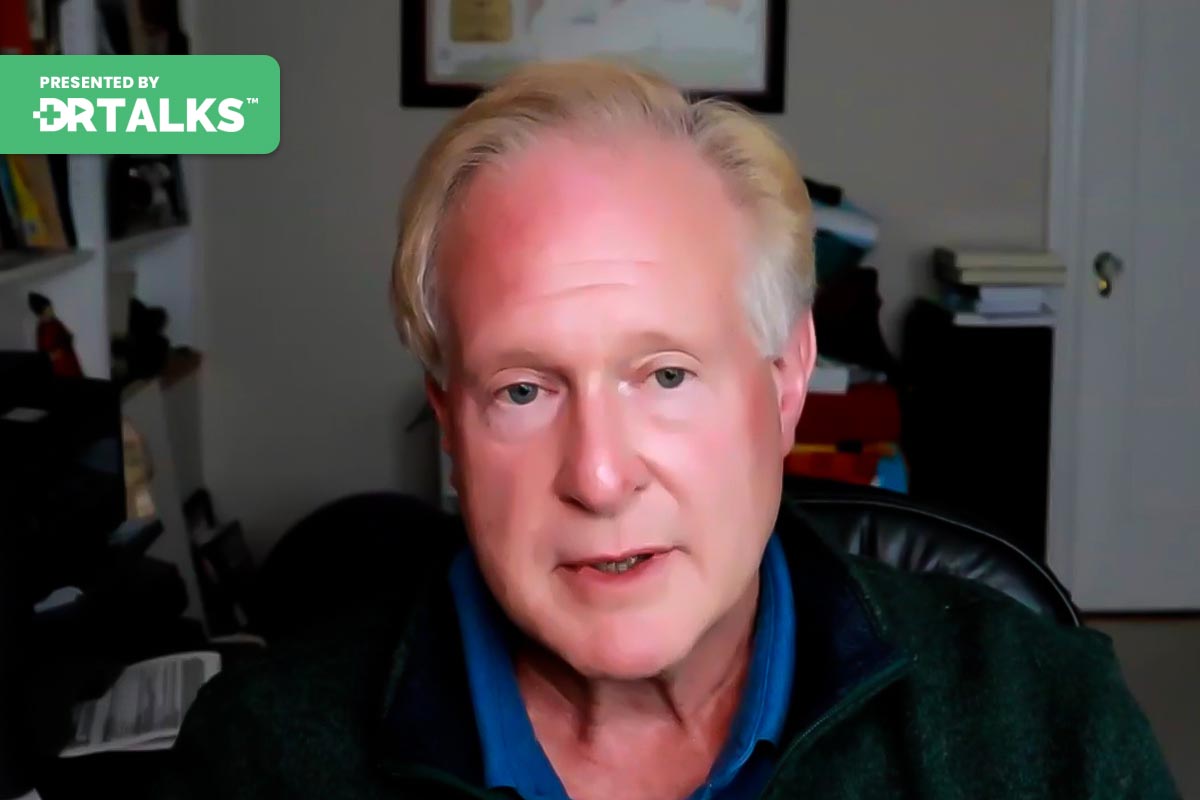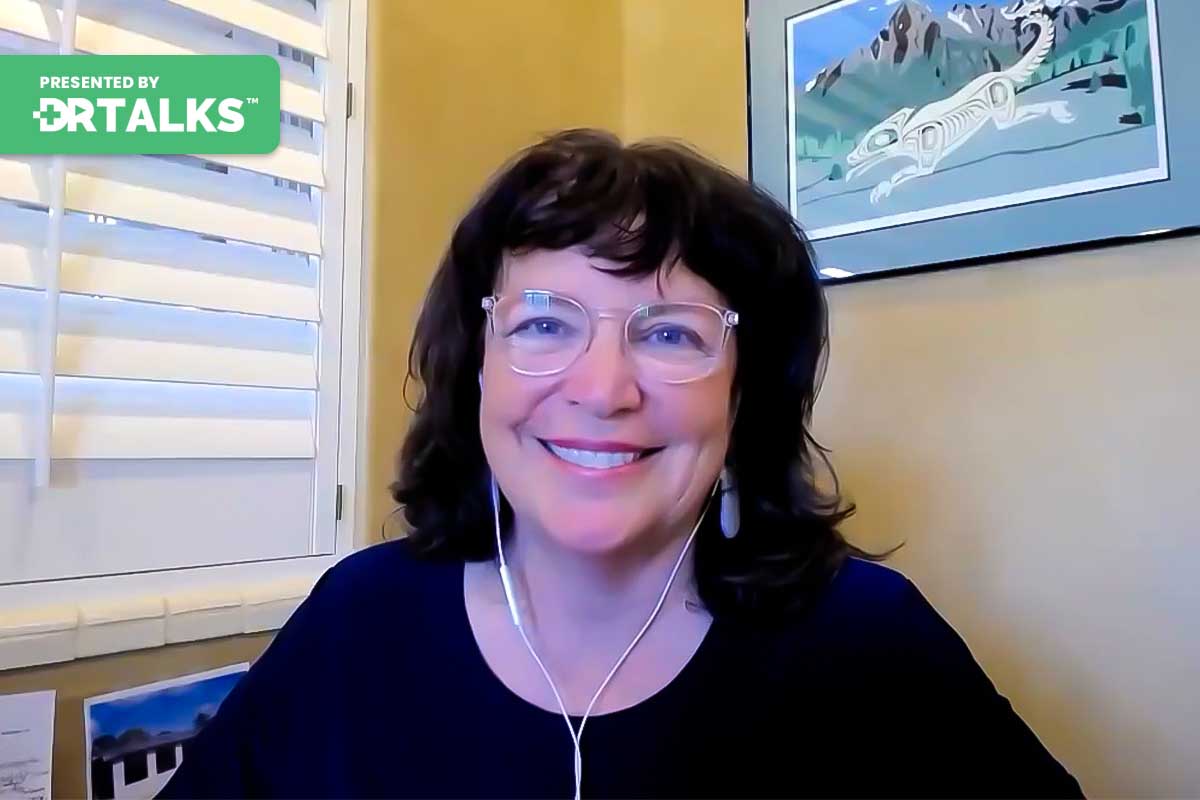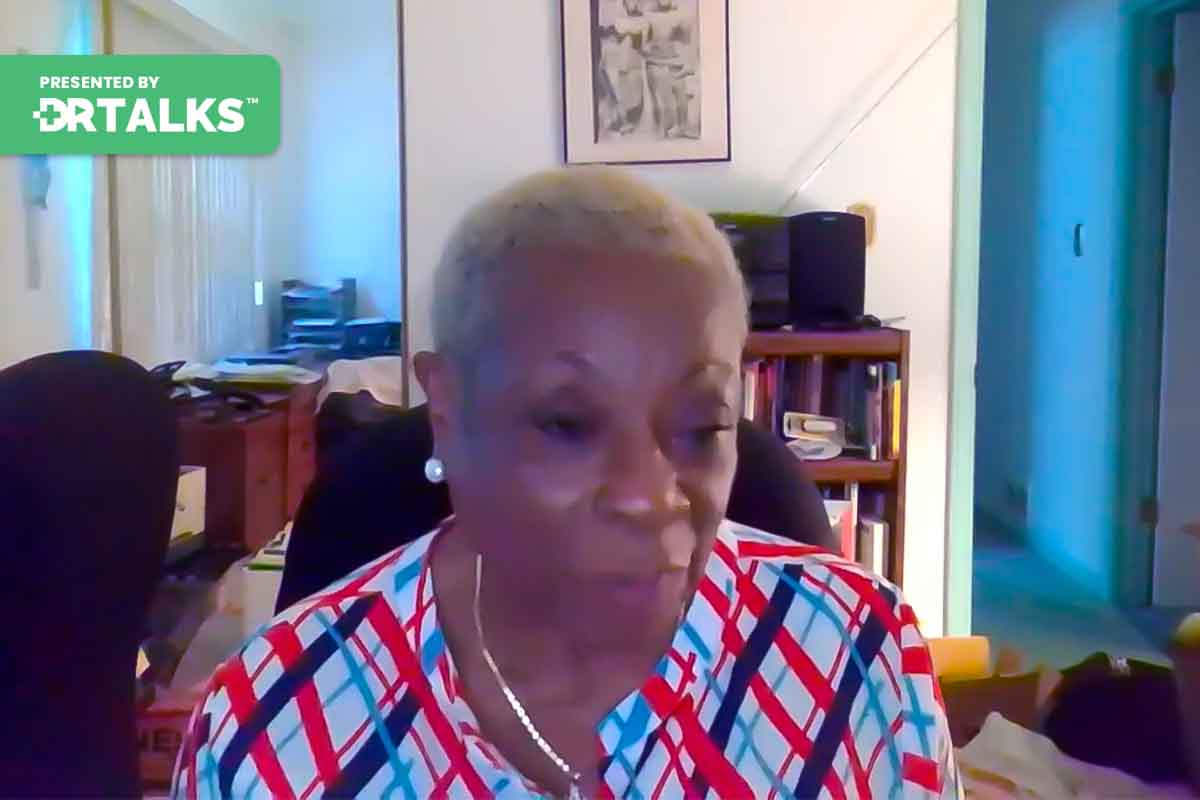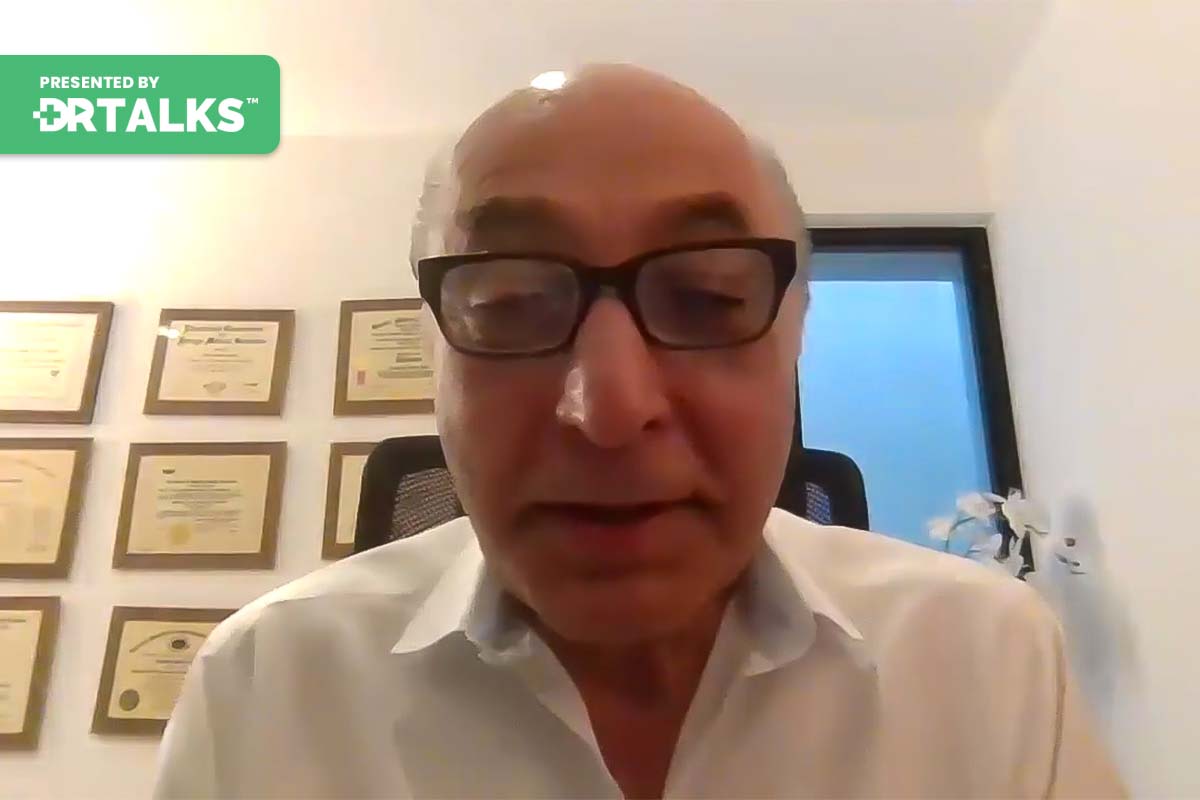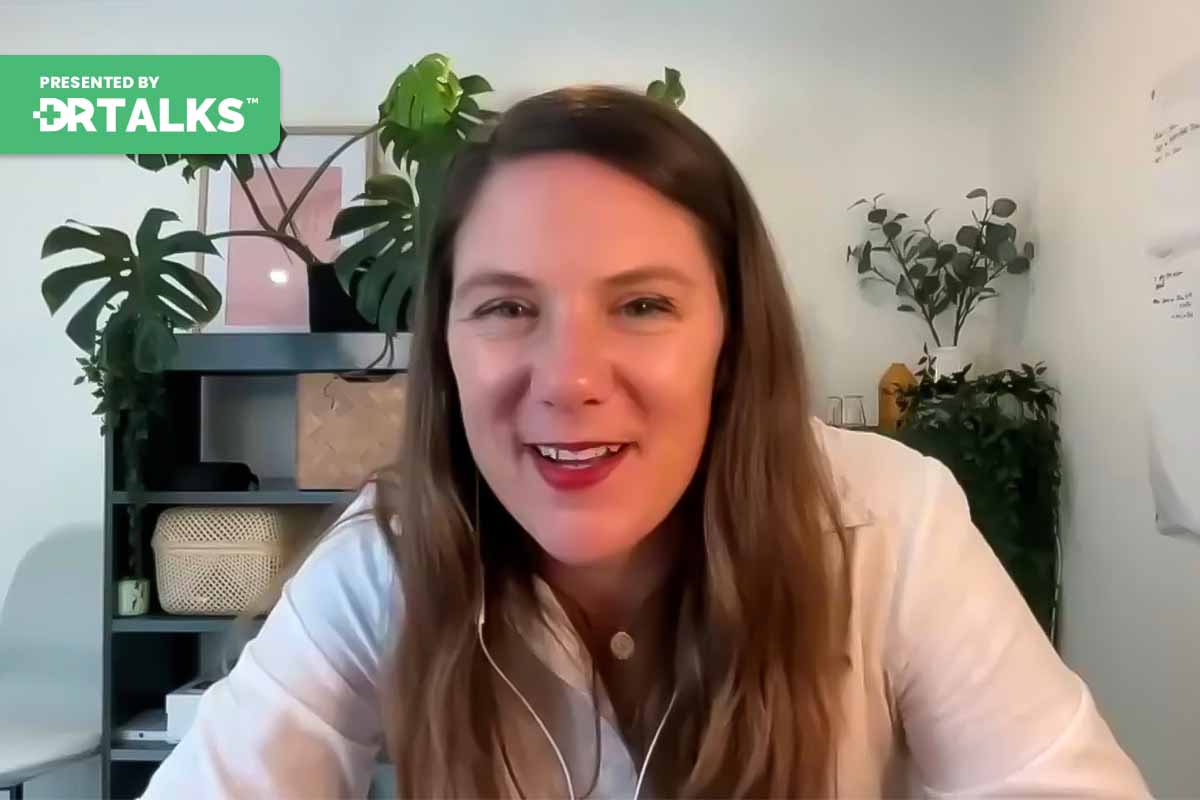Join the discussion below
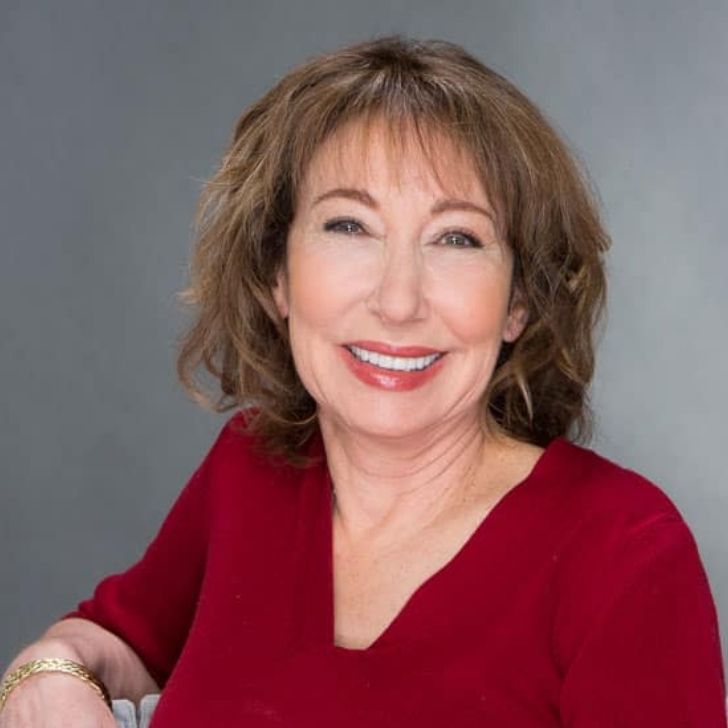
Felice Gersh, MD is a multi-award winning physician with dual board certifications in OB-GYN and Integrative Medicine. She is the founder and director of the Integrative Medical Group of Irvine, a practice that provides comprehensive health care for women by combining the best evidence-based therapies from conventional, naturopathic, and holistic... Read More
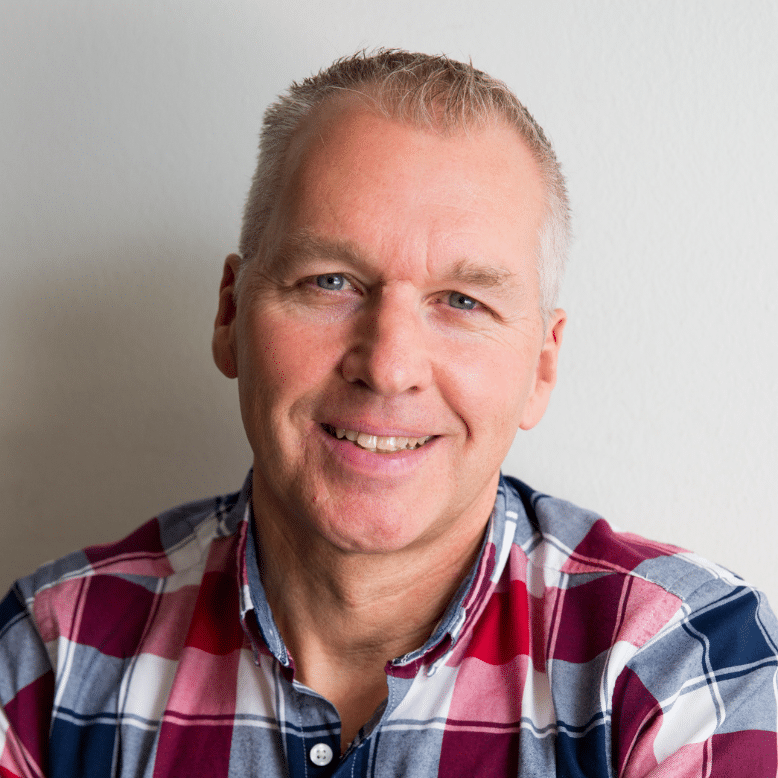
A British-born, naturalised American, Peter Bowes is a freelance journalist and broadcaster. He has spent much of his career working in news, current affairs and documentary-making for the BBC. A self-experimenter, when it comes to his own diet and exercise, Peter is fascinated by lifestyles and science-based regimes that promote... Read More
- Learn what ‘healthspan’ means and why it’s a vital concept for well-being
- Understand the negative impact of ageism on health and longevity
- Discover the importance of routine and sleep in promoting a longer health span
- This video is part of the PCOS SOS Summit
Felice Gersh, MD
Welcome to this episode of the PCOS SOS Summit. I’m your host, Dr. Felice Gersh. With me for this episode is my friend Peter Bowes, a longtime journalist and host of the popular podcast Live Long and Master Aging, also known as Llama. Now, women with PCOS are often just looked at as younger women who suffer from reproductive problems and problems with their periods fertility, pregnancy, androgen excess. But so often they’re forgotten as far as the issue of aging. And we all age and women with PCOS suffer from a higher incidence of cardio metabolic complex occasions like hypertension and diabetes. So aging is really a critically important subject for women. With PCOS with. So Peter, thank you so much for joining me. And you have on your podcast interviewed so many people who are experts in the subject of healthy longevity. So. Well, first of all, tell us about your own journey. Like how did you get interested in the topic of aging? And then we’ll get into some of the pearls that you’ve acquired from all of these interviews.
Peter Bowes
Well, Felice, first of all, it’s wonderful to be talking to you again about this subject of aging. And I notice that you just said we all age. And that’s something that I often repeat, because I’m not a huge fan of talking about reversing aging or anti-aging. Aging for me is something that moves forward. It’s chronological one year follows the next. But crucially, we can do something about how we age. And clearly biological aging is different to chronological aging. We get older, but our bodies, through interventions that we learn about through science, could actually feel and operate as if we were younger. So that is the key issue that I like to focus on, and that is healthy aging, pursuing a good health span, optimizing the number of healthy years that we have as opposed to trying to reverse aging anti-aging, which I think sometimes just gets a bad rap. It’s a phrase that’s used widely, but I think it’s also widely misunderstood. So that’s kind of from a philosophy perspective where I studied what got me into all of this. Well, I just have been a long time journalist. I’ve worked on documentaries and many feature stories about aging and longevity, made documentaries about the aging process. And I think just doing that over a number of years has captivated my interest and attention. And the podcast started in 2017 to try to give me a longer form format of podcast is that there can be any duration you want. You can keep talking and do you do justice to a subject that I think we need to get into some depth? So that’s what piqued my interest. Before that, though, I’ve always been interested in just living the best life and being physically as healthy as possible and trying to pursue an optimum diet. And it’s both work in progress. I think as we learn more about the science, we can dig down into what the best diet is, what the best exercise regime is for us. Those are still number one and two alongside getting good sleep for me in terms of the things that we need to do to optimize the aging process.
Felice Gersh, MD
So in terms of so many interviews that you’ve done, and I know some of them have been with people who’ve lived to a very long age. Have you noticed anything that distinguishes that group? You know, the people who live very long and healthy lives versus the rest of us out there, the average American.
Peter Bowes
I think there are lots of factors. I think there is something called the longevity gene. I think some people do have that genetic makeup that just helps them keep on going and going and going. And you talk to these very old people and you discover from their family trees that, yes, their mother lived to a great age and that their grandmother did as well. Others, it’s the lifestyle and it’s very clearly the lifestyle and common factors are often but not universally associated with the diet that they’ve followed throughout their lives. One issue that I probably the issue that most interests me talking to really old people is the issue of social connections and that especially as they get older, that seems to be still crucially important to them, that they are surrounded by friends and family and they have something to look forward to. There’s always something happening tomorrow or the next week or the next month involving other people, and I think that is a key factor in people just keeping going beyond, let’s say, 100 years old, that they have that optimism in life. They still have a purpose in life. It’s very difficult to do no lockdown in terms of science and peer reviewed papers and that kind of thing. What is it about optimism? What is it about purpose in life that keeps people going? But the evidence to me is that it is a key factor. And it’s always interesting to me to see how different people apply that to their own lives, just to to keep on going and to still be happy and to still be optimistic and still be invigorated at 100 plus.
Felice Gersh, MD
You know, I agree that is so critical. And unfortunately, women with PCOS tend to suffer at a higher rate from mental health challenges like depression and anxiety. And a recent paper came out showing that as a general group, women with PC was actually live a little shorter lifespan. So I mean, the idea that you conquer some of these mental health issues, which of course involve social connection. So in terms of like your own life, you know, because you have been listening and learning. So what do you do? And then maybe we can talk about, you know, other things that people can do to try. You know, we’ve all just been coming out of this pandemic, which has had such a huge negative impact on emotional connectivity. And so, I mean, do you have any helpful hints that maybe all of those listeners out there can think about, like, you know, like maybe even having a pet?
Peter Bowes
Well, the first thing I would say is we’re all different. So what applies to me may not apply to you, or indeed everyone else. But I think there are common factors that we can probably all apply to ourselves. You mentioned pets. That is key for me. I got to very, very lively dogs. They’re border collies. They’re traditional sheepdogs. So they are full of energy. And they inspire, they encourage. They bully me into getting out and exercising every day if I needed that encouragement. And some days you do need encouragement to get out. So there is no excuse for me and that goes into my exercise regime. So early in the morning. I usually do a long one hour hike with the two dogs and it is part of my routine. Maybe routine is something we can talk about because I think routines are crucially important when we’re talking about what we do to pursue a long, healthy life. I think it needs to be built into our daily schedules. So the long hike is a must for me, for my reasons and for the dog’s reasons as well. It’s also fun. It’s also quiet. I get out into the canyons north of Los Angeles and it’s a fairly apart from the dogs being with me, it’s a fairly solitary experience. The sun is rising. It’s good to expose ourselves, as you know, to sunlight early in the morning that helps to invigorate our circadian rhythm. It kick starts the day. So I think there are lots of good, positive reasons why I should follow or anyone should follow that kind of regime, if you can. And that’s why I say we’re all different, because my lifestyle and my work lifestyle allows me to do that. And I fully acknowledge that a lot of people can’t do that. They don’t have the time. They’ve got children to care for.
They’ve got to get in the car to get under the freeway to get to work at 6 a.m.. So it isn’t possible for everyone to follow the same kind of lifestyle, but that’s what works for me. And then just purely in terms of exercise, I do resistance training, weightlifting training. I try to do that two or three times a week. I think that as we age, that kind of exercise is important for our muscular strength and for our energy and to avoid frailty as we grow older. I also swim trying to do that two or three times a week as well and rest. I think it’s always important that at least one day of the week you minimize your exercise just to allow the muscles to do what muscles do, and that is to repair and to regrow. So I think it’s an ongoing process. It’s something you need to pay attention to every day of the week. But the key of all of this is movement. Keep moving, move all the time. I use a stand up desk for some of the time, not all of the time, but it’s constant movement that is really beneficial.
Felice Gersh, MD
Absolutely. You’re a great role model. And in terms of some of the things you mentioned that I think would be worth going back to is getting sunlight and you’re outdoors a lot. You know, you’re doing these wonderful hikes in nature. So maybe you could touch on what you’ve learned talking to some of these other experts about circadian rhythm, about timing, about sunlight, and also the issue of getting out in nature.
Peter Bowes
Well, yeah, a circadian rhythm is crucial and I think it’s underestimated by a lot of people. And essentially what that is, that is the 24 hour body clock that is in large part governed by our exposure to light. The body clock is kick started in the morning as soon as we expose ourselves to light, ideally sunlight. Obviously you don’t look directly at the sun, but you can look into the leaves. You’ve got some blue sky, look into the sky, and that will just set your circadian rhythm for the day and the types of light that we expose ourselves to during the day, whether it be blue light or red light. Red light, of course, crucially important later in the day, especially as it helps us to sleep overnight. And again, that changes according to what we’re doing. So for inside a lot, while we may encounter some problems in terms of light exposure and how it is affecting our brain and how our brain is helping our body throughout the day and its different moods and preparation. The release of hormones, which of course you’re the expert in to especially help us to sleep overnight. But I think that it is crucially important. I think it is underestimated. And, you know, if you want my advice as the non-scientist here, as the journalist talking to the experts, the message that I hear constantly is as early as you can expose yourself to to natural light and minimize the blue light that you and I are receiving right now, sitting in front of computers minimized that the blue light exposure later in the day because that is going to likely hinder our ability to sleep.
Felice Gersh, MD
And I want to emphasize this to all of you out there listening with PCOS, because it’s actually published data showing that women with PCOS inherently have sort of a disorganized, dysregulated circadian clock and they often will have the highest level of cortisol, which should be in the morning. They’ll actually have it at night and it’ll be lower in the morning when it should be high and getting you energized. So following all of this advice that Peter is giving is so crucial for you with PCOS even more than the average person because you’re working with a little bit of a handicap. And I always emphasize, if you can, which you mentioned red light go out and see the beautiful colors of the sun set. Right, because there’s something magical about our connection to Earth. Right? That and our universe that seeing the colors of the sunset actually helped to lower that cortisol and raise the production of melatonin. So this is like really crucial advice and then it leads into sleep, right? Because what about sleep? What have you learned about the importance and what can you do for all of those insomniacs out there to help them to get better sleep?
Peter Bowes
I think sleep is crucially important. I would put it alongside diet and exercise. I would always put it at number one because certainly in my experience and the experience of lots of people is that if you have a bad night’s sleep, that is inevitably going to affect your day, your motivation to exercise will generally go down if you’re feeling too tired to do it. In terms of diet, I think we are more inclined. At least this is my experience. If you are tired, you’re more inclined not to pay attention to a good diet during the day. I think you’re more inclined to eat sugary foods because you feel as if you need that energy boost. You might overdo the coffee and the tea and the caffeine intake because you’re tired. So it all stems from getting a good night’s sleep and what you say about red lights and watching the sunset, all of that melatonin release, all crucially important. And again, I would say more important than people realize, you almost have to be a self experimenter. Try it for yourself. Try experiencing that kind of slow, easing yourself into the evening, maybe going for a gentle walk after dinner, hopefully an early dinner. I think eating late can affect your sleep.
So I try to stop eating by 6 p.m. to have some gentle exercise after that. I think it helps your digestion, but it also exposes yourself to the end of the day as far as nature is concerned, as far as sunset is concerned, and again acknowledging that people watching this around the world may not have such a beautiful climate that we have in California. It isn’t always possible, but limit the amount of exposure that you have to, certainly to blue light, to two computers. Put your phone down if you can, after six, seven, 8:00 in the evening and ease yourself into a sleep and not only apart from light isn’t the only issue that it’s stimulation that you’re getting from technology that just stops you sleeping. You might receive an email at 9 p.m. that is a little worrisome that upset you thinking about something that is something you could have left till 9:00 the next morning. But again, that is something that might actually stop you sleeping. So multiple factors here come into play, but you kind of need to experiment a little bit. What works for you to help you ease into sleep and crucially get that deep sleep, which tends to happen earlier in the evening. The dream part of your sleep, when you dream a lot, tends to come later in the evening. But they’re both crucially important.
Felice Gersh, MD
And I know that specifically with women with PCOS, sometimes they have trouble sleeping because they feel so wired and tired and stressed and they have sort of this imbalance of the autonomic nervous system where they don’t have enough parasympathetic like we call vagal tone, the sort of natural relaxation state. And they have too much sympathetic output from their autonomic nervous system where they’re kind of in that sort of stressed state. So from talking to so many of these longevity experts, what about stress and helping to deal with it? You talk about there’s such a thing as walking meditation, getting out in nature. How about other tools? Like you said, not everybody lives in our beautiful environment. They can’t just get out and walk in beautiful nature every day. So have you learned of any other techniques that might be accessible to people to help them deal with this pervasive stress?
Peter Bowes
You know, yeah, there are lots and lots of ways and it’s crucially important and I think it is a growing problem in our constantly wired world that we live in, that stress builds up on people sometimes without thinking about it, and then it can hit you and it can take a long time to rectify the problem, to come down from those really high levels of stress. And there are lots and lots of ways to deal with it. I think breathing and learning, breathing techniques is a really good way to deal with stress. And again, I’m not the expert, so I’m not the educator on this. But what I’ve learned is that you can learn some very simple breathing techniques, slowly breathing in, maybe holding your breath for a second or two, and then slowly breathing out through your mouth and just doing that repeatedly at multiple times during the day. If you’re feeling stress and even if you’re not feeling stressful, try to build that kind of behavior into your daily life. And I think, again, it’s especially important for sleeping that don’t just lie there and think, I can’t sleep. I’m know, what can I do? Should I get out? Should I walk around? Should I try to read a book? All of those things can help. But also breathing is something I find that helps and I breathing in the sort of measured, controlled way that I’ve just described can actually help you fall back to sleep. I think it’s really important, aside from that, other things that can help with stress, exercise, walking, the simple things in life, enjoying your pets and their company, enjoying the company of your loved ones, building into your scheduled time just to maybe sit with a coffee in a cafe away from the hustle and bustle. Don’t have your laptop with you. Meet a friend that you haven’t seen for a long time. Schedule. Listen to your daily life. I have what I call white spaces in my calendar where I don’t schedule anything. I don’t plan for anything. It’s just there for me time. It could be an afternoon, it could be an hour. It could be half an hour. But it’s time to to just to relax, to ease yourself away from the world and, you know, exercising, you know, doing anything particularly vigorous. But you can find yourself coming back invigorated from that downtime.
Felice Gersh, MD
Well, those are great suggestions. I know for myself, some of the things that I enjoy are like a relaxing, hot bath. I love listening to Soft. I call it relaxing, sort of spa like music, and that’s why they play. It inspires and also the limbic system, which is part of the emotional system in the brain, is very sensitive to smells, you know. So sometimes just like people know about lavender, essential oils and there’s frankincense and rose geranium. So everyone, like you said, has to find what resonates with them and really stick with it, because we know that stress, pervasive stress, can trigger high rates of things like heart attacks. It can trigger metabolic dysfunctions. Right. You’ve gone through all of that and actually increased the risk of insulin resistance. So it’s not just about emotions. It really everything links back to the body as a whole. Right. And in terms of how the physiologic functioning of the body relates to the emotional functioning of the body and have you seen that in the people who reach long ages that they’ve really learned to master the emotional component of life?
Peter Bowes
Totally, yes. I think that’s a crucial factor. That’s what interests me about really old people is there is a calmness about people over a certain age and there isn’t a definitive age that they achieve this. But there is a happiness, there is a kind of level headedness about life and stresses, putting things into perspective. I think some of that just does come with age and wisdom and an ability to set aside the things in life that are stressful. Now, yes, of course, older people generally are not working. They’re not so concerned about the coworkers and the office environment and maybe the office politics and promotion or getting the next job. All of those stresses that affect younger people. So I think some of it does just come with the territory of being older and perhaps a little freer from the strains of everyday life. But I think there’s also the wisdom factor and that is learning and sometimes learning without realizing it. And that’s something I find about older people that they’ve achieved this great status of being a centenarian, that being over a hundred years old without actually realizing how they haven’t really thought about it. And it’s sometimes not until you interview these people that certainly I begin to realize and dissect their lives. This is why you’ve probably achieved this and then you can discuss it and explain. And so, well, yeah, I’ve always done that. I’ve always eaten in this way. I’ve always taken a walk around the lake every morning without understanding what it was doing to them. So I think some of it just comes off lifestyle. And if you look at some communities around the world, perhaps more primitive communities than you and I live in in the Western world, less advanced communities that enjoy a simpler life. You can see some of these factors coming through in the health of people who may not enjoy as good a health care as you and I have may not enjoy is access to the science that we have. But it’s a simpler lifestyle that sometimes actually promotes better health than people enjoy in parts of the Western world.
Felice Gersh, MD
Well, I agree. And of course, a lot of people refer to our healthcare system as the sick care system. Right. That it’s not really about the things that we’re talking about. List child medicine, you know, talking about the environment, but rather the pill to the ill and surgical procedures. And of course, my goal is to try to keep all key people from having to get too involved in the healthcare system because, you know, every drug has lots of side effects and so on. And one of the things that you mentioned in terms of like blue zones, like talking about people in these other communities, is I’ve heard that some of them try in terms of their eating not to overstuffed themselves and mealtimes are more relaxed and so on. So getting back to this whole fundamental that you mentioned in the beginning about food and so on, so what are some of the key issues that you’ve come across in terms of what to eat, when to eat, how to eat, that? These are fundamental issues involved in healthy aging.
Peter Bowes
Yeah, it is absolutely crucial and it’s something that I’ve been looking into a lot. And again, I feel like I’ve said this a few times. What applies to me may not apply to you or indeed everyone else, because we all respond to food in different ways. Some of us I’m mostly pescatarian, so I get most of my animal protein from fish. I don’t eat red meat anymore. I’m mostly vegan stroke, vegetarian, so I do eat a little bit of dairy. But it is generally a diet that involves getting protein from legumes, from, from beans and from peas and of course, from the many vegetables that they include protein. And I think that’s overlooked by a lot of people that we actually can get a lot of protein from a vegetarian diet. That’s generally what I do. I try to limit mealtimes to breakfast, small lunch and early dinner, and I try to have a fasting period, if you can call it fasting. It’s a restriction of food intake between the hours of, let’s say six, 6:37 p.m. and about seven or 8 a.m.. So I’m getting a roughly 12 to 14 hour not eating period. Some people dispute whether that is genuinely fasting because yes, you’re fasting because you’re not eating, but you’re not going into the state that you would go into with fasting for a three or four day fast. You’re not getting into ketosis where you’re using ketone bodies as opposed to glucose. You’re just breaking yourself from food overnight. And there’s a lot of good research. Professor Sachin Panda has done a lot of good work in this area, the Salk Institute in California showing how we can benefit from time restricted eating and basically just giving ourselves a break every day from eating that we don’t need to do. And I think that’s one of the problems with a lot of people that we eat because it’s almost a comfort. Snacking during the day, I think is one of the great ills of our time and it is encouraged by advertising that is bombarded, utters from television and cinemas and billboards in the street to a snack and to eat fast food. Those are the kinds of dietary interventions that I think are probably most important for most people, to cut out the junk food and to cut out the snacking.
Felice Gersh, MD
Oh, I agree 100%. And we know that everything goes back to the ancient Chinese wisdom of like the yin yang. You know, like sometimes you are awake and you’re active, sometimes you sleep and sometimes you eat and sometimes you don’t. Because we live in a society where eating can be almost perpetual, right? When they look at the eating habits, some people talk about fasting, they fast for maybe 6 hours a day that they don’t eat because they’re eating way up until they go to sleep and then they don’t get an adequate length of sleep. And then they’re eating again and they’re snacking all day long and often on the wrong foods as well. And in terms of foods, I know there’s been a big emphasis on fiber and that our society eats so little fiber. Do you have any like pearls that you’ve come across in terms of like the importance of fiber foods.
Peter Bowes
Apart from saying that they are crucially important and overlooked? I would say and I think that the kind of diet that I eat that has an emphasis on mostly vegetarian bites, very nature, means that I get a lot of good fiber. So some of these things you know, are important, but you don’t have to think too deeply about how to achieve it. So if you’re eating plenty of vegetables, yeah, I wouldn’t like to put a number on that, that helpings of vegetables, but, you know, 5 to 8 helpings of vegetables and fruits a day and focusing on legumes, the beans, the peas, which I put in almost every dinner, you’re going to get enough fiber and you know, you tell me you’re more of an expert than I am in terms of digging deep into the science there. But I think by its very nature, if you eat that kind of diet, you’re going to get plenty of fiber. And fiber, of course, crucially important for your digestion, for your stomach, for the balance of your stomach and the digestion processes. I think, you know, you don’t always need to think about it. You’d need to have a generally good balanced diet and you’re probably going to be doing okay. What I’m not a huge fan of is taking supplements to correct every perceived ill. So I know there are lots of fiber supplements you can take. I don’t think they’re necessarily and again, doesn’t necessarily apply to everyone, but for me they’re not necessarily.
Felice Gersh, MD
Oh, I 100% agree. And when you eat the right foods, you don’t have to count how many grams of this and how many grams of that. It’s just like the magic of the whole Foods, you know, all comes in one package with the polyphenols and the antioxidants and the different types of fiber, the soluble, the insoluble, the resistant starch and so on. And then you don’t have to buy these products that are, you know, products of inulin. It’s extra things that you have to try to buy because you’re spending most of your food calories on eating processed foods and animal products and so on, which aren’t going to do what. Now, we understand is so important. And I’ve wondered if any of the guests that you’ve had on your podcast have talked about the gut microbiome, this collection of trillions of microorganisms that turn out to be critically important for our health and their living. And they have to have food. And the food they love is the plant based foods and the fibers and the polyphenols and so on. So has that come up in any of your interviews?
Peter Bowes
Yes, it has come up and it will come up in the near future as well. I’ll be doing interviews that really dig deep into the microbiome. And again, it’s an aspect of our metabolism that we generally don’t think about. We can’t see it. It is invisible, which is why I think it is widely overlooked by most people that there is this entirely other world going on insiders and how crucial it is to almost every facet of our being. And it’s that important that we need to think about the foods that we eat and especially the plants that we eat, because this is a sequence of events, isn’t it? And, you know, better than most that we will get things from certain plants and especially fruits. I know pomegranates are particularly rich in some of the compounds that we need to nurture our microbiome. And it is a sequence of events. I’ve done a lot of work on something called Urolift in a which is hugely important as part of our being to nurture the health of our mitochondria. The energy centers of every single cell apart from red blood cells, but every single cell in our body, we need it for energy.
We need it for strength. We need it being mitochondrial energy and strength and vitality. And mitochondria are constantly renewing themselves. It’s called mitophagy. Cells in our bodies constantly renew themselves. The process is autophagy and for that to happen, we need a healthy microbiome so that doesn’t dig too deep into the science, but it illustrates why what we are consuming, how it affects our gut microbiome and ultimately how it affects our energy and ultimately how it affects our able to get through life and have the strength that we need to do what we do. And especially talking about my mitochondria and strength and muscle strength not fall into frailty as we get older. If we have deteriorating muscular strength, older people, older people generally become frail, they will have a fall. How many times have you heard? I’ve had a fall or they had a fall. And that was the really the beginning of the end. Things really seem to go downhill from that point. So that’s why we need to stay strong as we get older. And it’s all part of this elongated sequence of events that has the microbiome at its heart.
Felice Gersh, MD
Oh, my goodness. That is so true. And I know so many of my old family members have had that kind of a fate, you know, have a fall, a fracture, and then everything just goes downhill from there. And in terms of the microbiome and I know that the listeners can learn more from getting on board with your podcast because like just the subject of your listeners is so critically important. And the idea that we have these so-called superfoods, like pomegranates, always falls into that category. And like, why? Like what’s unique? Well, they have these amazing polyphenols, like ellagic acid, but then you have to have the right gut microbiome right, in order to convert it to the end product. So you’re elephants. And that’s why, you know, sometimes you do need supplements and so on to help you and while you’re nurturing your gut microbiome. And so maybe you could tell us a little bit more about your podcast so that people could know how to access it and the different types of interviews that you have on there, because we barely scratched the surface of what goes on in terms of the whole body and healthy aging. And this is so important for everyone, and I can’t emphasize that, especially certain categories of populations like women with PCOS who have sort of this extra level of challenges. So this is so important they can access and learn so much through your podcast. I know I have, so maybe you could share a little bit more about that.
Peter Bowes
Well, yes, thank you. And it is crucially important. And as you say, and you just made a very good point that we all different and just not to go into too much detail. But there are lessons and you’re Alison, which is something we’ve talked about a lot on the podcast. We are not all made the same. We don’t have the same ability to essentially convert what we’re getting from plants and pomegranates into the year listeners that we need. And that’s where supplementation is indeed important. And that’s the kind of thing that I’m learning from the podcast in terms of how we can learn from the latest science. And a lot of this science is just evolving in the last five, ten years that we can really benefit from. And I think one of the problems with peer reviewed science professional scientific journals is that they are inaccessible to most people because they are, by their very nature, very technical and no one’s fault that we can’t all understand this very detailed language. So what I tried to do in the podcast is really simplify things down, explain them in a way that, first of all, I can understand, and then hopefully people listening to the podcast can glean something positive from the information. So that’s dissecting good peer reviewed, professionally done science. There’s a lot of junk out there. There’s a lot of junk information on the Internet.
Don’t believe everything you read. And one of the challenges for me, one of the things I try to do is to filter that information and focus on the things that are really important, that are reliable, and that we can actually learn from and apply to our own lives. And that’s why I’m really quite careful in terms of who I interview on the podcast. I like to look at their background and the seriousness with which they follow that research, who they collaborate with, to make sure that any information that is shared on the podcast is as reliable as possible. So that’s from the informational perspective. I also just try to provide a bit of inspiration and positive encouragement to people in this aging process, which I know can be very difficult for people. It can be depressing when you feel as if you’re not making any progress and I just try to instill by talking to these wonderful older people about how they are managing their lives, just to try to give us all a little bit of encouragement.
Felice Gersh, MD
Well, I love the blend on your podcast between people who are living, you know, the healthy longevity life and the scientists who help people to understand how to be like those people, you know, to live a long and healthy lifespan where they’re not just alive, but they’re actually vigorous and doing all the things they want to do and love to do for, you know, decades and decades, even beyond what the average person achieves. And I can’t recommend more strongly that everyone go and subscribe to your podcast, Llama Live Long and Master Aging. It is really up there among the top tier of all podcasts involving medicine and science and certainly healthy longevity. And where can they find your podcast?
Peter Bowes
It’s very kind of, you to say that you can find us online so we are llamapodcast.com that’s L L A M A P O D C A S T .com. We fairly recently launched a youtube channel as well, so just go into YouTube YouTube and search for live long and master aging or if you search my name, it’ll probably also come up as well. But if you are on just to dove into the detail, if you’re on the YouTube, we are at YouTube.com: @llamapodcast it’s quite easy to find it. And what I’m finding from the YouTube interviews and I’ve had a few people say this to me is they like to see the expression on people’s faces. They like to see the response of a scientist or whomever I’m interviewing, just like you. And are you doing now envision the response to certain questions because I think you can read in to the expression on someone’s face a lot. So you can do much more than you can do with audio. I think the audio podcast is valuable clearly for people, and I listen to a lot of audio when I’m walking, when I’m driving, I think it’s a valuable way to share information. But hopefully the YouTube channel, the video channel is giving a new perspective.
Felice Gersh, MD
Well, I love it. We all like to have visuals, like we like to match the face with the voice. So I’m so glad that you’re doing that. And I can’t thank you enough for rejoining me. Peter, on my summit here. And I know that people are going to continue on their healthy longevity journey because we want everyone to live the best life that they can. And this really gives them the information and some of the tools that they need to achieve that. And so thank you again for joining me.
Peter Bowes
Hopefully, it’s always a huge pleasure. You’re doing some fantastic work yourself. I want to applaud that and it was really good to talk to you.
Downloads

